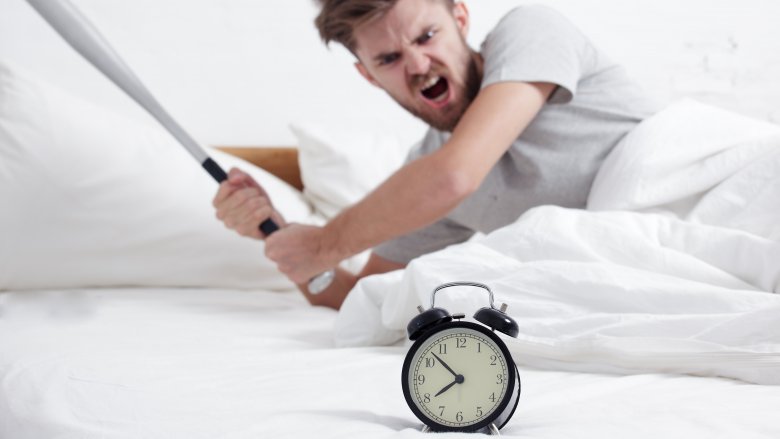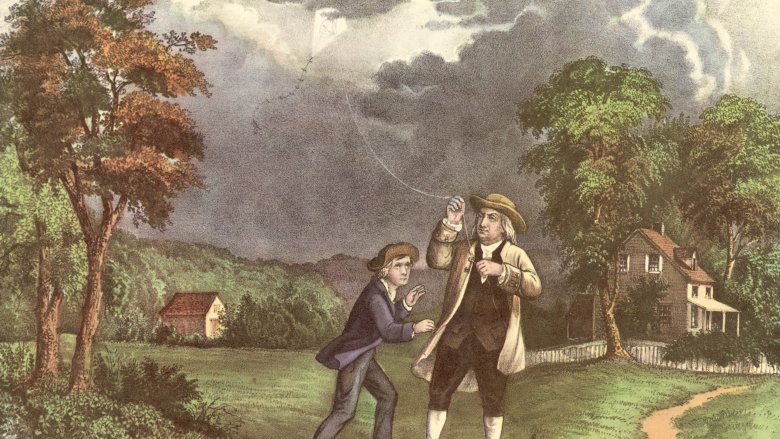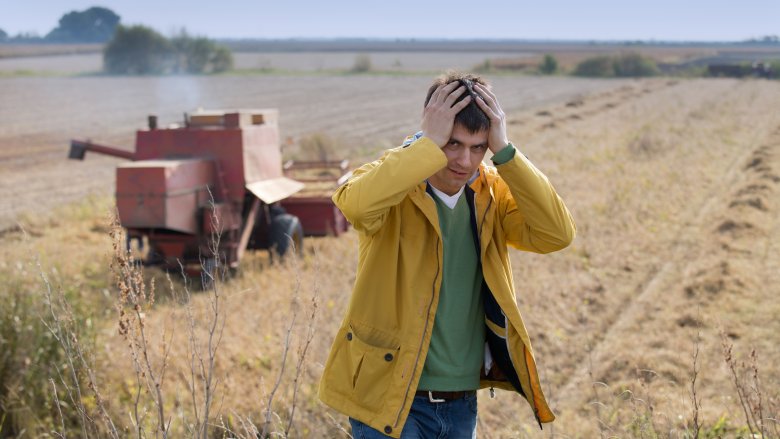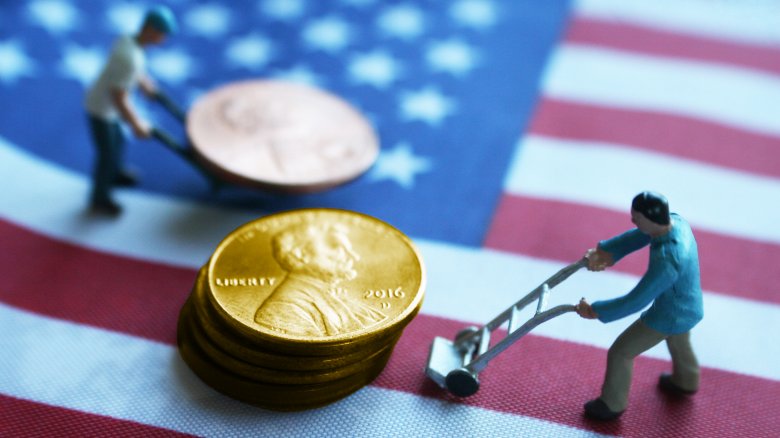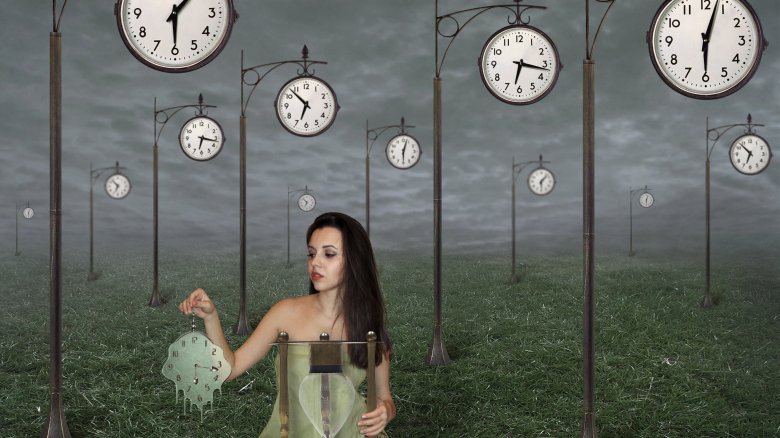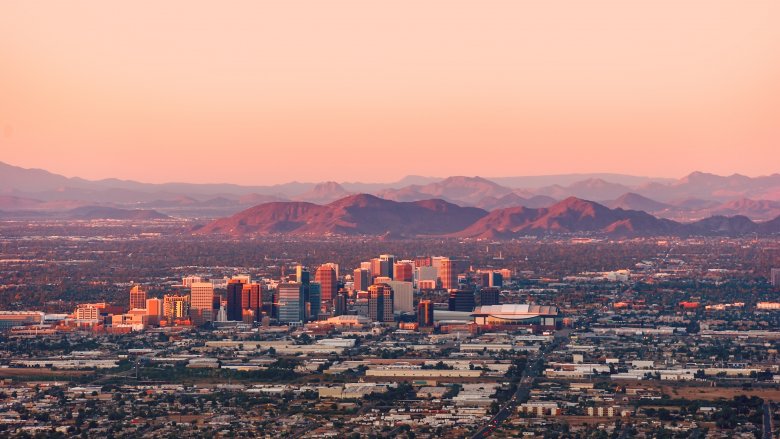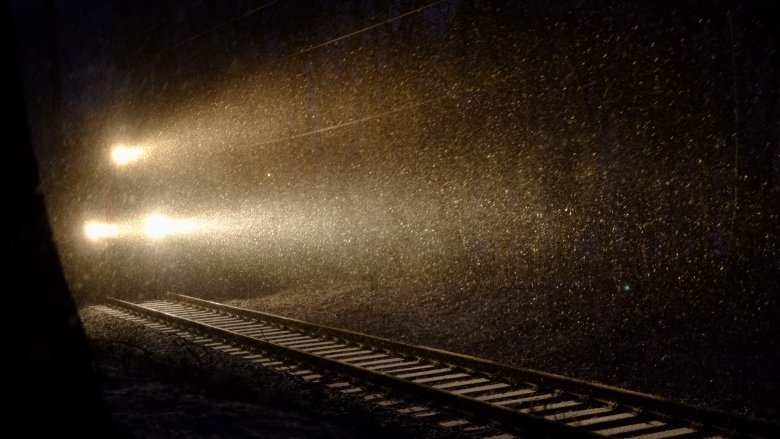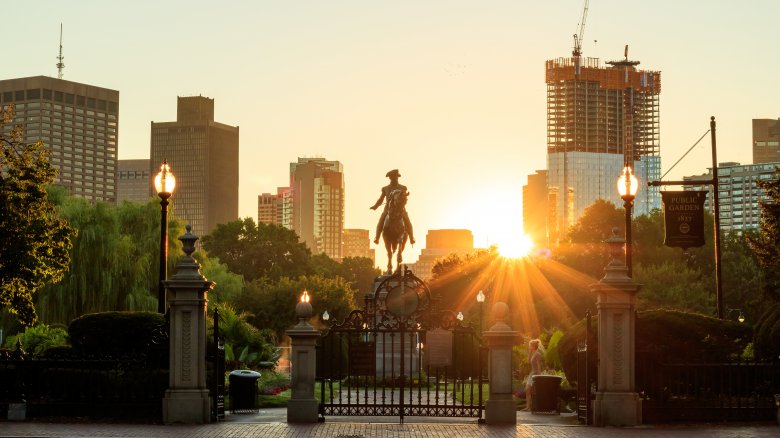Bizarre Facts You Never Knew About Daylight Saving Time
If there's one biannual tradition that most people would probably be happy to leave behind, it's the antiquated ritual of changing our clocks twice a year. Don't you just love losing an hour of sleep every spring? Probably not. Not to mention, how (not) fun is it to watch the sun set at 4 p.m. every winter?
Daylight saving time — and yes, it's "saving," with no tagalong S, despite how everyone says it — has been around for a long time, even though the only people who enjoy it are Halloween candy retailers and your weird friend Phil who just likes to be a contrarian about everything. However, the true story of daylight saving time (DST) is far weirder than you might realize, and all this clock-swapping madness actually has a profoundly negative impact on nearly every facet of society. Here are some of the stranger ones.
DST is bad for your health
There is no one in the world who looks forward to losing an hour of sleep every spring, coming into work groggy, and then spending the next few weeks trying to adjust. One of the more annoying things about this torturous ritual we subject ourselves to is that, as told by Business Insider, DST makes us less productive.
Honestly, should this even be a surprise? Our natural circadian rhythm is regulated by light, which determines how much melatonin our bodies produce. Messing around with that natural system creates havoc and causes us to have less steady or effective sleep patterns. Bad sleep decreases our performance, and destroys our concentration, no matter how much coffee we drink to make up for it. A study at Ludwig-Maximilian University in Munich, cited by ABC, showed evidence the human body's internal clock actually never adjusts to DST.
What does all this sleepless fatigue result in? Bad stuff. First of all, it puts people in a sour, depressed mood, according to Economics Letters. Business Insider points out that some studies have shown increases in suicide numbers after the switch. A greater number of workplace injuries happen, according to APA PsycNET. Scariest of all, the American College of Cardiology points out that the first Monday after daylight saving time sees a shocking 25 percent spike in heart attacks. So yeah, messing with an entire population's biological clocks twice a year can have serious consequences.
It was supposed to be a joke
Benjamin Franklin always gets the blame for daylight saving time. It's easy to see why, since people also always want to attribute that obnoxious "healthy, wealthy, and wise" quote to him, a line which has been used to torment night owls for generations. However, it's time to absolve this man of such a mean-spirited accusation. Franklin didn't invent daylight saving time. He just wanted to gently tease his friends in Paris.
See, the source of Franklin's "invention" is his humorous 1784 essay, titled An Economical Project. Readers will note that Franklin never recommends anything so crazy as literally switching the clocks back and forth, and the essay just pokes fun at the Parisians for staying up late every night, with Franklin pointing out that they'd save a lot of money on candles if they matched their sleeping patterns to the sun.
For context, Inc. magazine explains that Franklin was in France at the time, representing the United States, since the two nations were close allies. He submitted the essay to his friend, who was the editor of Journal de Paris. Franklin's piece does include calculations on how much the average Parisian spends on candles between March and September, and he does outline a satirical "system" wherein candle usage would be strictly monitored by the police. But again, it was all a joke, nothing he ever intended to see come to pass. If only he could've known what the future held in store.
It's bad for the economy and doesn't save much energy
Well hey, daylight saving time must be good for the economy, right? Nope. Actually, DST regularly punches the economy in the face for no good reason, costing the U.S. an estimated $434 million a year. According to the Huffington Post, the U.S. town that gets hit the worst is a place called Morgantontown, West Virginia, where each of the town's 129,709 citizens lose about $3.40 a year. Sure, that's not so much, but for what benefit?
According to the Washington Post, when DST was lengthened some years back, U.S. airline companies cried foul, with the Air Transport Association estimating that the problems associated with lining flights up with other countries would cost them $147 million. TV stations despise when the clocks roll forward because ratings sink.
It gets stranger. The entire reason for daylight saving time is supposed to be in the name of saving energy costs, but ironically, results show that the savings are either slim, nonexistent, or the complete opposite, where energy usage goes up. The most notable studies have been conducted on Indiana, a state that only fully switched to DST fairly recently. The National Bureau of Economic Research found that "DST increases residential electricity demand," largely due to higher cooling and heating costs. The research found an overall electricity increase of 1 percent, causing Indiana households to pay an additional $9 million a year in energy costs. Probably not what Indiana was hoping for.
Don't blame the farmers, they lobbied against it
The history of DST is like a game of telephone, where someone thinks it's funny to add in expletives then blame you for the faux pas when the last person says the now-vulgar message aloud. Benjamin Franklin had nothing to do with this craziness. The other charge that gets fired a lot is that DST was instituted out of a noble, oh-so-American desire to help out the poor farmers, so they could have that extra hour of sunlight.
Uh, no. This is actually a cruel twist, considering farmers fought tooth and nail against the implementation of daylight saving time, according to History.
Farmers absolutely hated DST, and the agriculture industry lobbied hard to keep it from passing into U.S. law in 1918. Once you take a step back and see it from a farming perspective, you really can't blame 'em: an average farmer's day was scheduled according to sunlight, so changing the hours disrupted their whole routine. It caused farmers to have to wait an entire extra hour for the Sun to come up, led to hired hands working an hour less, and the animals didn't care whatsoever about following some mechanical clock. While the image of a good, friendly farmer tending his crops might make someone almost feel guilty for hating DST, it's just an illusion. The true proponents of daylight saving time were a lot more corporate.
The real cause of daylight saving time is corporate greed
Time for the masks to come off. DST has nothing to do with farmers, energy, or Benjamin Franklin. No, like many societal problems, it's all about squeezing a little more profit.
Just ask Michael Downing, author of Spring Forward: The Annual Madness of Daylight Saving Time. In an interview with NPR, Downing explains the real reason we've been stuck with DST is that corporations, retailers, and stores want people to go spend money. As he puts it, "They understood that if their department stores were lit up, people would be tempted by them."
In 1986, both the golf and barbecue industries pushed for a longer DST period, saying it would make them hundreds of millions. Daylight saving has absolutely nothing to do with saving energy, a fact that Downing clarifies by pointing out another industry that profits hugely from DST: big oil. Even if people use their light bulbs a little less, they get in the car more, so gasoline profits go up.
Another major proponent of DST is the candy industry. When they're not busy giving people diabetes, candy giants are gearing up for Halloween, and they fought really hard to get an extra trick-or-treating hour in, hoping for more candy sales. During a 1985 hearing, they reportedly left little candy pumpkin treats on every senator's seat, hoping to get DST extended into November.
It was a total mess when it first got implemented in the U.S.
In 1916, according to History, Germany became the first nation to adopt daylight saving time. Less than a month later, the U.K. did the same. It took another two years before the United States initiated it, albeit as a wartime measure. Then the country spent the rest of the century ironing out the kinks. Because oh boy, were there some serious kinks.
DST officially ended after World War I, and that's when the problems started. Some places kept DST, others ditched it, and some did it their own way. There were no strict guidelines on how to properly preserve time, so big cities would do it one way and small towns might start on a different day. Iowa had 23 different sets of start/end dates, so dinner dates must have been a huge mess to figure out. This insanity was described by Time magazine as a "Chaos of Clocks."
In 1966, Congress passed the Uniform Time Act, proclaiming that from that day forward there would be six months of "standard" time and six months of DST. Of course, the results haven't been quite so clean-cut, but things are definitely less confusing than they were before ... other than the fact that the U.S. is a single country with four separate time zones, a problem that Matthew Yglesias of Vox argues could be truly fixed by getting rid of time zones altogether, across the globe.
Some states still opt out
Now, despite the passing of the Uniform Time Act, there are a couple of hot spots that are still standing defiantly against the whole biannual clock-switching mess. If you're a North American who grew up in one of these places, there's a good chance you never even knew what this weird frugality-with-an-unchangeable-quantity concept was until you moved somewhere else or heard about it from a distant family member.
Arizona rejected daylight saving time in 1968 and hasn't looked back, according to Time. Arizonans get so much light and sun anyway that they don't see much purpose for it. The one chunk of Arizona that does follow daylight saving time is the Navajo Nation, which covers a big chunk of its northeastern corner, but that's mainly because the reservation also covers parts of New Mexico and Utah. Hawaii is the other state that doesn't bother with daylight saving, based on the reasonable argument that its proximity to the equator makes such a measure totally meaningless.
Along with these two states, a number of U.S. territories have also opted out of the arrangement, including Puerto Rico, the U.S. Virgin Islands, Guam, and American Samoa.
It does super weird things to Amtrak schedules
You know one thing daylight saving time really gets in the way of? A proper train schedule. If you're unlucky enough to have hopped on an overnight ride with Amtrak during the time change, you could find yourself sitting in a stopped train for a complete 60 minutes. Isn't saving time great?
Don't blame Amtrak on this: they have to maintain a consistent schedule, day after day, so as inane as this sounds, there really isn't much else they could do.
Amtrak explains this in its official system timetable. On that terrible "spring forward" day where an innocent little hour is murdered in the night, trains automatically become an hour late, and then have to rush ahead and try to make up the time. (And they're probably already late, so this is a lost cause.) During the "fall back" hour, overnight trains must sit at the station, motionless, to wait for the time to match again. What a bummer. This has been something that overnight train passengers have had to deal with for a long time, as shown by this 1985 New York Times article about a bunch of disgruntled passengers who didn't realize they would spend an entire hour sitting in hell a dark train station in New Jersey.
DST ruins SAT results
If you want to see a teenager sweat bullets, start talking to them about the SAT. Most high schoolers despise any form of standardized testing, and there's nothing more intimidating than learning that your college admission will largely depend on how well you score on this stupid test — particularly if you aren't sure you even want to go to college what with how much everyone gripes about student loans.
Anyway, you'd figure everyone would be making a lot of effort to ensure that every student does as amazingly on the SAT as possible. Instead, we make them groggy with daylight saving time; one study indicates the resulting fatigue makes kids do worse on the SAT.
Once again, this report came out of Indiana, since until fairly recently the vast majority of Indiana's counties did not participate in daylight saving time. The research, printed in the Journal of Neuroscience, Psychology and Economics and summarized by Business Insider, studied a decade of Indiana SAT scores and found that students living within the counties that did "spring forward" scored 2 percent lower on the SAT than the counties that didn't bother with the time-dance. The researchers didn't draw any firm conclusions, but did suggest these results point to the possibility that the disrupted circadian rhythms and melatonin production were the cause.
It causes twins to be born in the wrong order
Sibling rivalry is already chaotic enough without arguing about who came first and why, but consider this proposition: what happens when a twin childbirth occurs during the "fall back"? Say one twin is born right before the hour of 2 a.m., then the second twin is born after the clocks roll back? Lots of confusing paperwork and a lifetime of good-natured ribbing, that's what.
And this has really happened. According to People magazine, twin brothers were born in Massachusetts on November 6, 2016, right at the weirdest possible time. Samuel Peterson was born first, at 1:39 a.m., and his brother Ronan arrived in the world about 30 minutes later, at what should have been 2:10 a.m. Thanks to the miracle of DST, it was now 1:10 a.m., making Ronan appear to be "older" on paper. Cape Cod Healthcare shared this story on Facebook as a riddle of the day. Don't be judgmental: it's a harder riddle if you aren't already thinking about DST.
New England might revolt against the clock madness
The New England states have always been famous for their massive revolutions, particularly the one that involved dumping lots of tea into Boston Harbor. Now, the Commonwealth of Massachusetts is planting its battle flag in new territory, getting ready to mount an attack on all this clock switching mayhem.
The Boston Globe notes that important voices in Massachusetts are voicing the opinion that the state should adopt daylight saving time on a yearly basis. So no clock switching, no springs forward or falls back, just one yearly constant. Currently, Massachusetts locals have to deal with their sunsets happening at the ridiculously early hour of 4 p.m. every December. Adopting year-long daylight saving time would mean darker mornings but lengthier, sunnier afternoons. The state commission argues this would aid in college student retention — by brightening up the dreary winters a bit — as well as reducing crime and (classic!) increasing retail sales.
However, the state commission also argues that making the move would only be a good idea if they can get the other New England states to follow their lead. Maine and New Hampshire have voted on this in the past, but failed. However, if they all banded together, there would be more potential for success.
What if this rebellion works? What if the entire nation wants to follow suit? According to Vox, all we'd need for yearlong daylight saving time would be an act of Congress.
